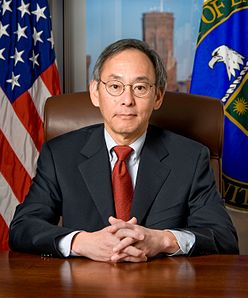Steven Chu
| Steven Chu | |
|---|---|
 |
|
| 12th United States Secretary of Energy | |
|
In office January 21, 2009 – April 22, 2013 |
|
| President | Barack Obama |
| Deputy | Daniel Poneman |
| Preceded by | Samuel Bodman |
| Succeeded by |
Daniel Poneman (Acting) Ernest Moniz |
| Personal details | |
| Born |
February 28, 1948 St. Louis, Missouri, U.S. |
| Political party | Democratic |
| Spouse(s) | Jean Fetter |
| Children | 2 |
| Alma mater |
University of Rochester University of California, Berkeley |
| Awards | Nobel Prize in Physics (1997) |
| Website | physics |
| Steven Chu | |||||||
| Chinese | 朱棣文 | ||||||
|---|---|---|---|---|---|---|---|
| Hanyu Pinyin | Zhū Dìwén | ||||||
|
|||||||
| Transcriptions | |
|---|---|
| Standard Mandarin | |
| Hanyu Pinyin | Zhū Dìwén |
Steven Chu (Chinese: 朱棣文; pinyin: Zhū Dìwén, born February 28, 1948) is an American physicist. He is known for his research at Bell Labs and Stanford University regarding the cooling and trapping of atoms with laser light, which won him the Nobel Prize in Physics in 1997, along with his scientific colleagues Claude Cohen-Tannoudji and William Daniel Phillips.
Chu served as the 12th United States Secretary of Energy from 2009 to 2013. At the time of his appointment as Energy Secretary, Chu was a professor of physics and molecular and cellular biology at the University of California, Berkeley, and the director of the Lawrence Berkeley National Laboratory, where his research was concerned primarily with the study of biological systems at the single molecule level. Chu resigned as energy secretary on April 22, 2013. He returned to Stanford as Professor of Physics and Professor of Molecular & Cellular Physiology.
Chu is a vocal advocate for more research into renewable energy and nuclear power, arguing that a shift away from fossil fuels is essential to combating climate change. He has conceived of a global "glucose economy", a form of a low-carbon economy, in which glucose from tropical plants is shipped around like oil is today.
...
Wikipedia
